|
|
|
Sort Order |
|
|
|
Items / Page
|
|
|
|
|
|
|
| Srl | Item |
| 1 |
ID:
110149
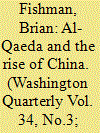

|
|
|
| 2 |
ID:
095540
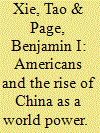

|
|
|
|
|
| Publication |
2010.
|
| Summary/Abstract |
The rapid ascendency of China has attracted considerable attention from American scholars, policymakers, and media. Yet what does the American public think about the rise of China as a world power? In this paper we use survey data collected by the Chicago Council on Global Affairs and other organizations to explore the nature and causes of Americans' views. It turns out that most Americans are well aware of the rise of China. Some are apprehensive about that rise, chiefly for national security (rather than economic) reasons, and many favor a degree of off-shore 'balancing' of the sort that realists recommend. But few Americans want to actively work to limit the rise of China. Very few favor the use of troops to defend Taiwan. Very few favor a nuclear-armed Japan. Large majorities of Americans take stands more akin to those of neo-liberals than realist theorists, favoring cooperation and peaceful engagement with China.
|
|
|
|
|
|
|
|
|
|
|
|
|
|
|
|
| 3 |
ID:
145769
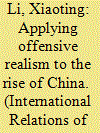

|
|
|
|
|
| Summary/Abstract |
This study employs offensive realism to provide a baseline for assessing Beijing's strategic choices in dealing with regional neighbors. In theory, when an ascending power is not yet capable of dominating its home region, it would strive foremost to prevent external powers from extending their influence in its vicinity. To attain that goal, it will likely adopt a carrots-and-sticks strategy, by rewarding some neighbors and punishing others according to their readiness to accommodate its ascendance and keep a cautious distance from external powers. Empirically, China's management of territorial disputes from the 1950s onward is quite consistent with these theoretical expectations. Viewed in this light, restraint and assertiveness are not inversely related in Chinese foreign policy behavior. Rather, they are two sides of the same coin and serve the same overriding purpose of countering adversarial (especially US) influences in China's neighborhood.
|
|
|
|
|
|
|
|
|
|
|
|
|
|
|
|
| 4 |
ID:
085856
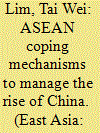

|
|
|
|
|
| Publication |
2008.
|
| Summary/Abstract |
ASEAN has been proactive in reacting to the economic and political challenges of the rise of China without being overly hostile, reactionary or protectionist against China in a conscious effort to co-prosper with China herself. At the same time, smaller ASEAN neighbours of China hope that China will continue to pursue a policy of good neighbourliness. With this background in mind, the thesis questions for the essay are: what are ASEAN's coping mechanisms to manage the rise of China? How do these questions feature into the overall tussle of ideas between realists and non-realists?
|
|
|
|
|
|
|
|
|
|
|
|
|
|
|
|
| 5 |
ID:
167467
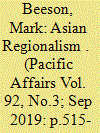

|
|
|
| 6 |
ID:
103775
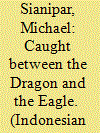

|
|
|
| 7 |
ID:
097397
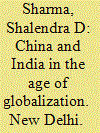

|
|
|
|
|
| Publication |
New Delhi, Cambridge University Press, 2009.
|
| Description |
xi, 321p.
|
| Standard Number |
9780521198936, hbk
|
|
|
|
|
|
|
|
|
|
|
|
Copies: C:1/I:0,R:0,Q:0
Circulation
| Accession# | Call# | Current Location | Status | Policy | Location |
| 055050 | 303.48251/SHA 055050 | Main | On Shelf | General | |
|
|
|
|
| 8 |
ID:
182945
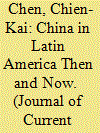

|
|
|
|
|
| Summary/Abstract |
Examining China’s policy towards Latin America from 1949 to the present day, this article uncovers a puzzle about China in Latin America: while the guiding doctrine of China’s policy towards the region has never changed (i.e. “South–South Cooperation” on the basis of the “Five Principles of Peaceful Coexistence”), there is a difference in terms of its policy goal between then and now (i.e. a very revisionist and politically focused goal until the late 1970s as compared to a less revisionist and economically focused one today). Based on the theory of systemic constructivism, this article demonstrates that the change of the interactions between China and other countries in our world (from isolation and confrontation to engagement and interdependence) has changed China’s perception about the nature of the international system, as well as its identity and interests in the system, which in turn has changed its policy goal towards Latin America and the “Global South” in general.
|
|
|
|
|
|
|
|
|
|
|
|
|
|
|
|
| 9 |
ID:
174430
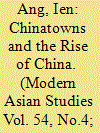

|
|
|
|
|
| Summary/Abstract |
In the early twentieth century, Chinatowns in the West were ghettoes for Chinese immigrants who were marginalized and considered ‘other’ by the dominant society. In Western eyes, these areas were the no-go zones of the Oriental ‘other’. Now, more than a hundred years later, traditional Chinatowns still exist in some cities but their meaning and role has been transformed, while in other cities entirely new Chinatowns have emerged. This article discusses how Chinatowns today are increasingly contested sites where older diasporic understandings of Chineseness are unsettled by newer, neoliberal interpretations, dominated by the pull of China's new-found economic might. In particular, the so-called ‘rise of China’ has spawned a globalization of the idea of ‘Chinatown’ itself, with its actual uptake in urban development projects the world over, or a backlash against it, determined by varying perceptions of China's global ascendancy as an amalgam of threat and opportunity.
|
|
|
|
|
|
|
|
|
|
|
|
|
|
|
|
| 10 |
ID:
097380
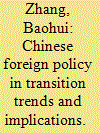

|
|
|
| 11 |
ID:
179268
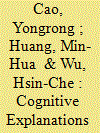

|
|
|
|
|
| Summary/Abstract |
In recent years, the economic development of China and India and their border confrontations have intensified bilateral strategic competition. This study used the State of Democracy in South Asia survey to identify dual mindsets of competition and contingency that drive how Indians perceive China’s influence in Asia. These two mindsets are based on a cognitive schema characterized by a political predisposition against China. However, this negative orientation is moderated as more information is acquired regarding the impact of China on India. The competition mindset does not always manifest itself, and is only cognitively activated when a change is perceived in India’s power status. On the other hand, the contingent principle appears whenever competition seems to have abated, or disadvantage seems unavoidable. The mindsets of competition and contingency are not only relevant to the evolution of Sino–Indian relations, but also explain how Indian policymakers behave and respond in international society.
|
|
|
|
|
|
|
|
|
|
|
|
|
|
|
|
| 12 |
ID:
159270
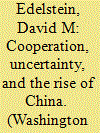

|
|
|
| 13 |
ID:
092203
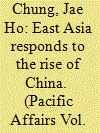

|
|
|
|
|
| Publication |
2009-2010.
|
| Summary/Abstract |
How is East Asia responding to the rising China? Pertinent literature suggests that explicit balancing or containment has been rare and engagement, if not appeasement, appears to be East Asia's modus operandi. Yet, this study argues that certain, though subtle, variations are nevertheless discernible among the regional states in their responses to China's ascent. Focusing on 15 East Asian states for the period of 2004-2007, the article first presents a bird's-eye view of East Asia's responses to the rise of China. More specifically, inter-state variations are empirically demonstrated and four principal patterns-bandwagoning, hesitant hedging, active hedging and balancing-are distilled from the key responses of these 15 nations. The article then examines the sources of these inter-state variations, and argues that they are conditioned largely by three factors: alliances with the United States, regime characteristics and territorial disputes with China. The article concludes with some observations as to East Asia's complex responses to the rise of China and their security implications for the region as a whole.
|
|
|
|
|
|
|
|
|
|
|
|
|
|
|
|
| 14 |
ID:
189257
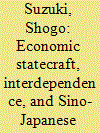

|
|
|
|
|
| Summary/Abstract |
China’s increasingly active economic diplomacy in recent years has often been deeply linked to its geostrategic interests. Japan is said to be watching this development with alarm. Analysts have often claimed that this has resulted in Sino-Japanese rivalry, where the Japanese see any gains made by China in zero-sum terms, and make concerted efforts to counter China’s growing influence. This article, however, is critical of such views. While elements of rivalry may indeed be visible in some aspects of Sino-Japanese relations, it would be premature to apply this perspective to economic statecraft, which is inherently multifaceted. This article claims that too much attention has been paid to the strategic aspects of Chinese economic statecraft at the expense of economic/commercial ones that could foster cooperative relations between Beijing and Tokyo. It argues that Japan does not hold a monolithic view that Chinese diplomatic activities in the economic realm are an axiomatic threat to Japanese security interests, and it remains premature to say that Japan and China are ‘rivals’ in the realm of economic statecraft. Future analysis in this area needs to pay greater attention to the complicating effects that economic interdependence can have in strategic policies.
|
|
|
|
|
|
|
|
|
|
|
|
|
|
|
|
| 15 |
ID:
118184


|
|
|
|
|
| Publication |
2012.
|
| Summary/Abstract |
The rise of China has led to a spate of scholarly and journalistic speculation about the future of a liberal world order. Apparently, the rise of a nondemocratic, Asian rival to US hegemony potentially undermines the growth of democracy throughout the system. Many see a resource-hungry China engaging itself globally out of purely self-interested motives, and Chinese business and aid offer a viable alternative to Western influence. Using the Stockholm Institute for Peace Research's (SIPRI) data on arms transfers since the end of the Cold War, we test the proposition empirically by assessing the nature and strength of Chinese politico-military support, measured as conventional arms transfers, globally and to African regimes. In short, we find that China relative to the United States transfers greater amounts of arms to democracies rather than autocracies, whereas the United States seems to prefer more autocratic regimes, despite rhetoric that claims an ethical foreign policy. The same result holds when we assess this relationship using human rights data. Moreover, Chinese arms transfers to countries suffering civil wars are much lower than the United States'. The findings are robust to the inclusion of several control variables and alternative estimation techniques. The findings show that popular perceptions about China's role in Africa do not match reality, particularly when assessed against the current hegemon's behavior.
|
|
|
|
|
|
|
|
|
|
|
|
|
|
|
|
| 16 |
ID:
142865
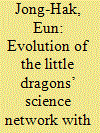

|
|
|
|
|
| Summary/Abstract |
China has emerged as a science superpower in the first decade of the 2000s. In the world of science, where collaborative research has become the norm, China may have a great influence over the international scientific research collaboration (ISRC) network. In this exploratory study, the author focuses on the ISRC of the Little Dragons (LDs) (i.e. South Korea, Taiwan and Singapore), which have grown into advanced economies and thus emphasise science as a facilitator of further development. Using the method of cosine similarity analysis and social network analysis, the author traces the evolutionary changes in the ISRC of the LDs and the position of China within the ISRC network from 2002 to 2012. The differences among the three LDs are discussed and implications are drawn.
|
|
|
|
|
|
|
|
|
|
|
|
|
|
|
|
| 17 |
ID:
143928
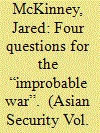

|
|
|
|
|
| Summary/Abstract |
“As long as the US holds tight to its values and solves its problems at home,” Andrew Nathan and Nathan Scobell have written in a well-regarded 2012 book, “it will be able to manage the rise of China.”1 This sentiment admirably expresses the long-standing consensus of the Washington, DC foreign policy elite: by using a combination of economic engagement, military balancing, and diplomatic pressure, the US can socialize Chinese elites while checking Chinese power. In such a scenario, China will rise, but it will rise within the existing international system. And even were China to consider violating contemporary norms—say, against the use of force to resolve disputes—the military power of the US and its allies would be overwhelmingly sufficient to deter, defend, or defeat the transgression. China’s rise, in short, need not threaten the status quo as long as the western powers deepen economic interdependence, preserve maritime supremacy, and maintain leadership of the international system.
|
|
|
|
|
|
|
|
|
|
|
|
|
|
|
|
| 18 |
ID:
192577
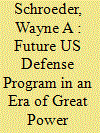

|
|
|
|
|
| Summary/Abstract |
The Great Power Competition requires a new defense posture that adapts to the exigencies of the Russia-Ukraine war and the rise of China. A successful defense posture will necessarily require a reexamination of US defense strategy, and, importantly, the level of resources devoted by the US and its allies to national defense. A defense real growth commitment should be initiated now and sustained for as long as this more competitive and threatening security environment remains in place
|
|
|
|
|
|
|
|
|
|
|
|
|
|
|
|
| 19 |
ID:
142978
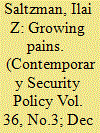

|
|
|
|
|
| Summary/Abstract |
The rise of China has attracted considerable scholarly attention since the early 1990s. Recent developments in Japan leave no doubt, however, that close attention to Tokyo's changing foreign and security policy also is in order. In a break with tradition, the government of Prime Minister Shinzō Abe's approved in 2014 a new interpretation of Article 9 of the Japanese Constitution, facilitating the shift from basic self-defence to collective self-defence that allows Japan to assume greater regional and global security assertiveness and responsibility. This article examines the trajectory of Japan's security policy transformation, focusing on the causes and nature of this dramatic reorientation. By applying a neoclassical realist framework, the article traces the intricate interplay between shifts in Japan's strategic environment, domestic politics and the security policy decision-making process. Abe and the hawkism he represents will undoubtedly face Herculean hurdles in the future. Still, continued external challenges will inevitably force Tokyo to ‘normalize’ its security policy and shed off the remaining relics of its pacifism and anti-militarism. The article also concludes that the significant inducements driving Japanese security normalization are challenged by powerful domestic opposition. While the process will remain piecemeal rather than revolutionary, the course of Japan's security policy favours continued self-assertion, emancipation and reform.
|
|
|
|
|
|
|
|
|
|
|
|
|
|
|
|
| 20 |
ID:
158053
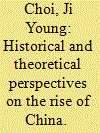

|
|
|
|
|
| Summary/Abstract |
In this article I borrow insights into repeated patterns of global political change from long cycle and power transition theories and apply them to the rise of China. China is on a trajectory to become the largest economy in terms of total economic size, but viewed through the prism of those insights, it has considerable weaknesses or barriers to overcome in order to become a global hegemonic power. Nonetheless, the rise of China could produce significant instability in the interstate system as it develops into a revisionist power. It is too early to conclude that China is a revisionist power, but some signs suggest China has revisionist aims in the Asia Pacific and could become one in the future. In this context, restraining the growth of Beijing's dissatisfaction with the current international order by accommodating it through appropriate roles and status must be considered more seriously by Washington. Another option is for Washington to enhance and upgrade its military capabilities in the Asia Pacific, but its ability to do so successfully hinges on its ability to reinvigorate the US economy.
|
|
|
|
|
|
|
|
|
|
|
|
|
|
|
|
|
|
|
|
|